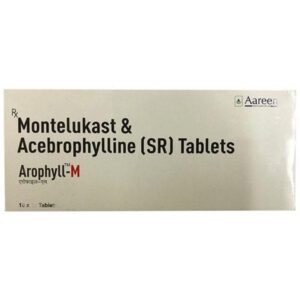MONTELUKAST + ACEBROPHYLLINE
Montelukast: Montelukast is a medication that belongs to a class of drugs known as leukotriene receptor antagonists. It is mainly used to treat and prevent symptoms of asthma and allergic rhinitis (hay fever) in both adults and children.
The mechanism of action of montelukast involves blocking the action of leukotrienes in the body. Leukotrienes are naturally occurring chemicals in the body that cause inflammation, bronchoconstriction (narrowing of the airways), and mucus production. By blocking the action of leukotrienes, montelukast helps to reduce inflammation in the airways, relaxes the smooth muscles surrounding the airways, and decreases mucus production, thereby improving breathing and reducing symptoms.
The dose of montelukast varies depending on the age and condition being treated. For asthma in adults and children over 15 years old, the usual dose is 10 mg taken orally once daily in the evening. For children aged 6 to 14 years old, the usual dose is 5 mg once daily in the evening. For allergic rhinitis, the dose is 10 mg once daily in adults and children over 15 years old, and 5 mg once daily in children aged 6 to 14 years old.
Common side effects of montelukast may include headache, stomach pain, diarrhea, nausea, fever, cough, sore throat, runny or stuffy nose, and allergic reactions such as rash, itching, or swelling. In rare cases, montelukast has been associated with behavioral and mood changes, including agitation, aggression, depression, and suicidal thoughts. It is important to seek medical attention if any severe or concerning side effects occur.
It is important to note that montelukast is not a rescue medication for sudden asthma attacks. It should be taken regularly as prescribed by a healthcare professional to control and prevent symptoms.
Acebrophylline: Acebrophylline is a drug used in the treatment of respiratory disorders such as asthma, chronic obstructive pulmonary disease (COPD), and bronchitis. It is classified as a bronchodilator and mucolytic agent.
The mechanism of action of Acebrophylline involves two main actions. Firstly, it acts as a bronchodilator, meaning it relaxes and widens the airways in the lungs, allowing for easier breathing. Secondly, it acts as a mucolytic agent, which helps in thinning and loosening the mucus in the airways, making it easier to cough up and clear congestion.
The typical recommended dose of Acebrophylline is 100 mg to 300 mg per day, divided into two or three doses. However, the exact dosage may vary depending on the specific condition being treated and the patient’s response to treatment. It is generally advised to take the medication after meals to minimize stomach discomfort.
Like any medication, Acebrophylline may have some side effects. Common side effects may include nausea, vomiting, abdominal discomfort, heartburn, headache, and sleep disturbances. These side effects are usually mild and transient. However, if any side effects persist or worsen, it is important to consult a healthcare professional.
In rare cases, Acebrophylline may cause more severe side effects such as allergic reactions, irregular heartbeat, chest pain, and seizures. If any of these serious side effects occur, immediate medical attention should be sought.
It is important to note that Acebrophylline should be used under the supervision and guidance of a healthcare professional. Dosage adjustments may be required for individuals with certain medical conditions or those taking other medications.

